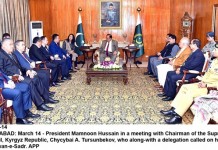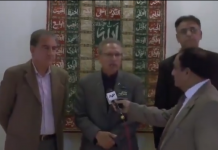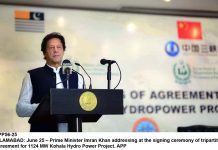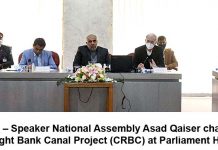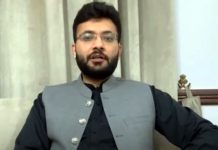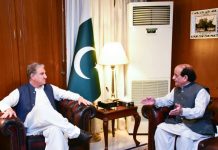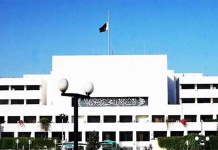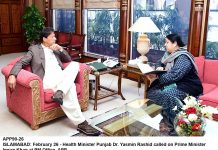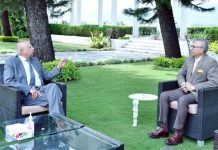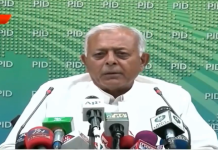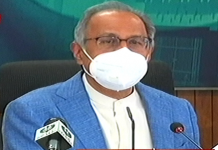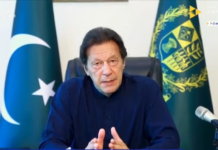Participating in the budget debate, Pakistan Peoples Party (PPP) Member, Syed Abdul Kadir Gillani urged the government to provide a share of development schemes to South Punjab and called for the reinstatement of the South Punjab Secretariat.
Highlighting PPP’s historical support for Pakistan Muslim League (N), he said his party’s signed the Charter of Democracy (CoD) in the national interest and supported the idea of Charter of Economy.
He appreciated President Asif Ali Zardari’s slogan ‘Pakistan Khappay.’ “I will present the bill for the Saraiki province and see who opposes it,” he said.
PPP Lawmaker, Shahida Rehmani expressed concern over the proposed tax increases, adding that they would make life difficult for 200 million Pakistanis.
She condemned recent incidents in Sargodha and Swat, said that such actions against minorities would bring bad name to Pakistan’s globally. “Islam is a religion of peace, and we must live peacefully,” she added. She criticized taxes on children’s milk. e.
Mir Ghulam Ali Talpur, another PPP member, called for increased incentives for the agricultural sector.
He said, that agriculture had achieved the highest growth rate at 6.25 percent.
The MNA criticized the focus on providing incentives to exporters and stressed the importance of bolstering the agricultural sector with more incentives.
“In principle, all types of income should be taxed, and it is a positive step in this budget that exporters’ income is now being taxed,” he added.
However, he criticized the imposition of taxes on tractors and agricultural pesticides, arguing that these measures could negatively impact the sector.
Iqbal Masood, a Legislator from Muttahida Qaumi Movement-Pakistan, highlighted the importance of understanding the concept and ideology behind the Special Investment Facilitation Council (SIFC).
He observed that until agriculture was recognized backbone of economy, the country’s financial position would not improve.
He criticized the tax on the salaried class and called for a review of taxes on the real estate sector.
Jamiat Ulema-e-Islam MNA, Muhammad Usman Badini highlighted the underdevelopment of Balochistan and urged for educational facilities for Baloch students like Lahore, Karachi, and Peshawar.
He acknowledged the upcoming commencement of work on the Reko Diq project and demanded technical training for Balochistan’s youth in institutions across other regions of the country.
PPP Member National Assembly, Sehar Kamran expressed concerns over proposed increases in petroleum levies and electricity prices, predicting inflation across all sectors.
While acknowledging the salary increases for government employees, she pointed out that the private sector would face greater difficulties due to new taxes.
Sheikh Waqas Akram, a member of the Sunni Ittehad Council (SIC), strongly criticized the proposal to maintain surcharges on consumers using more than 200 units of electricity for up to six months.
Another SIC member, Ghulam Muhammad Lali, urged Parliament to establish a fund to aid oppressed Palestinians in Gaza.
He stressed the need to assess effective ways to provide assistance, expressing deep concern over the perceived helplessness of the Muslim world, including the OIC, in aiding Palestinians.
He also criticized prolonged delays in payments to sugarcane growers and demanded completion of infrastructure projects, including roads and gas supplies in Faisalabad.
Taking part in the debate, Pakistan Muslim League-Nawaz’s Malik Abrar Ahmed praised the government for presenting a balanced budget despite difficult economic situation. He urged the government to resolve the water shortage issue being faced by Rawalpindi and Chaklala cantonments proposing to stop the leakage of water from the Khanpur project.
Pakistan Peoples Party’s Sadiq Ali Memon, proposing to make the budget more people-friendly, said the guidelines given by President Asif Ali Zardari in his speech to the joint session of the Parliament, including pathways to inclusive growth, should have been adhered to.
He urged the government to focus on the needs of persons with disabilities in order to bring them in the mainstream of the society.
Muttahida Qaumi Movement-Pakistan’s Rana Ansar criticised the undue taxes levied on the consumers in the electricity bills. She asked the government to reduce the price of electricity to provide a sigh of relief to the people.
To meet the climate challenges, she proposed to launch a massive drive for the plantation of trees across the country.
Sunni Ittehad Council’s Muhammad Atif Khan said the government should take concrete measures to stop the electricity theft and take a stern action against the electricity pilferers.
Jamiat Ulema-e-Islam-Pakistan’s Misbah Uddin mentioned the deteriorating law and order situation in the erstwhile Federally Administered Tribal Areas (FATA) and Waziristan (North & West). He regretted that the provincial government had not allocated any development funds for their districts.
PPP’s Mir Shabbir Ali Bijarani pointed out the issue of dacoits of Kacha involved in the kidnapping of businessmen for ransom. He claimed that the dacoits raomed in his constituency with modern weapons and urged the government to launch a military operation against them to resolve the issue on permanent basis.
PPP’s Asad Alam Niazi said political instability was damaging national economy, calling for collective efforts to get the country out of prevailing financial crisis. He opined that the government should devise long term policies instead of for a year.
Istekam-e-Pakistan Party’s Gul Asghar Khan suggested that the loss-making organizations sould be privatised as it would help cope with the meet economic crisis.
PML-N’s Rana Hayat Khan said his party leadership had saved Pakistan from default compromising on their political gains. He said Pakistan had received many milestones on economic fronts due to prudent policies of the incumbent government.
Participating in the debate, Syed Musa Gilani of the Pakistan Peoples Party (PPP) called for equitable development in South Punjab and advocated for the reinstatement of the South Punjab Secretariat. He also emphasized the need for increased incentives for the agricultural sector in Pakistan.
Khawaja Izhar-ul-Hassan of Muttahida Qaumi Movement (Pakistan) suggested revising the NFC award and allocating funds for Karachi’s uplift. He urged the government to take steps to ease inflation and supported the proposal to establish more provinces.
Shagufta Jumani, a Pakistan Peoples Party Parliamentarian, demanded relief in the budget for those suffering from high inflation. She criticized additional taxes on milk and the salaried class.
Sher Ali Arbab of Sunni Ittehad Council said that his party’s candidates, elected by the people, promote their party’s vision.
Chaudhary Tanveer Khan of Pakistan Muslim League Nawaz termed the budget balanced and people-friendly.
Izbal Zaheri, another Pakistan Peoples Party Parliamentarian, highlighted issues in Balochistan and urged the federal government to allocate more funds for health and education sectors.
She advocated for empowering women, stating that ignoring half of the population, the country cannot achieve progress.
Aijaz Hussain Jakhrani, also from the Pakistan Peoples Party Parliamentarian, criticized the Pakistan Tehreek-e-Insaf government for failing to deliver on promises made to the masses during their four-year tenure, citing record loans taken during this period.
Pakistan Peoples Party Parliamentarian Hina Rabbani Khar said that the people of the country are looking to their representatives to address their problems. She urged the government to announce subsidies for farmers.
Pakistan Muslim League Nawaz’s Dr. Darshan appreciated the Prime Minister and Finance Minister for announcing a balanced budget. He said that all segments of society have been provided relief in the budget.
National Party Pullain highlighted the issues of Balochistan, urging the Prime Minister to allocate more funds for its development.
He said that government employees should be provided with more relief in the budget.
